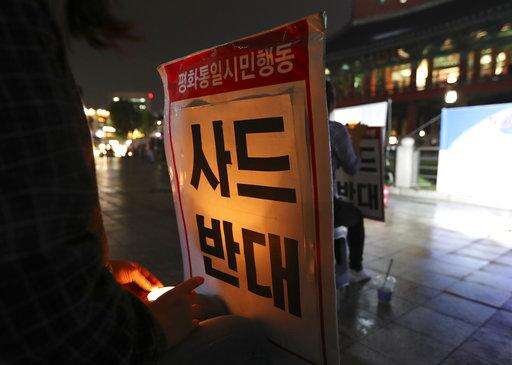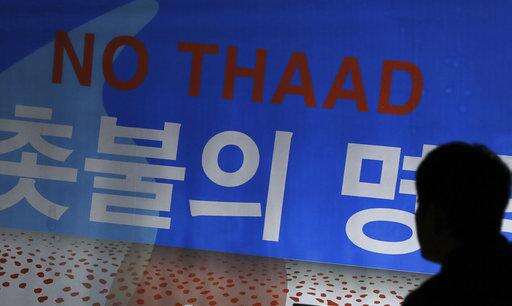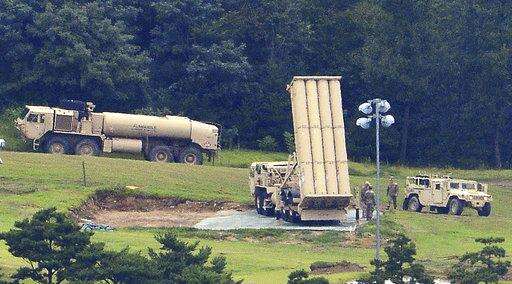Russian President Vladimir Putin, right, and his South Korean counterpart Moon Jae-in arrive for their meeting at the Eastern Economic Forum in Vladivostok, Russia, on Wednesday, Sept. 6, 2017. (Mikhail Metzel/TASS News Agency Pool Photo via AP)
The Associated Press
SEOUL, South Korea (AP) - The leaders of South Korea and Japan on Thursday repeated their calls for stronger action to punish North Korea over its nuclear ambitions, including denying the country oil supplies, as they met in eastern Russia.
The demand contradicted the stance of their host, Russian President Vladimir Putin, who in an earlier meeting with South Korean President Moon Jae-in dismissed sanctions as a solution to the country's nuclear and missile development.
Moon and Japanese Prime Minister Shinzo Abe agreed to cooperate on seeking tougher United Nations sanctions against North Korea, which conducted its sixth nuclear test on Sunday in what it claimed was a detonation of a thermonuclear weapon built for missiles capable of reaching the U.S. mainland.
Moon and Abe also pledged to strengthen efforts to persuade Beijing and Moscow into cutting off oil supplies to the North, said Yoon Young-chan, Moon's chief press secretary. Ahead of his meeting with Abe, Moon said that the North's continuing weapons tests have created a "serious and urgent threat unseen before."
In his meeting with Putin in the port city of Vladivostok, Moon urged Moscow to support stronger sanctions against North Korea, but Putin called for talks with North Korea, saying sanctions are not a solution to the country's nuclear and missile development. Putin also expressed concern that cutting off oil supplies would hurt regular North Koreans, Yoon said. Ahead of his meeting with Putin, Moon said the situation could get out of hand if North Korea's missile and nuclear tests aren't stopped.
"We should not give in to emotions and push Pyongyang into a corner," Putin said in a news conference after the meeting, held on the sidelines of a conference on economic development of Russia's Far East. "As never before, everyone should show restraint and refrain from steps leading to escalation and tensions."
Moon, in a phone call with Putin before the conference, also called for a ban on overseas North Korean workers, who are a key foreign currency source for the North. Putin told Moon that the North Korean problem should be solved diplomatically, according to Seoul's presidential office.
Moon took office in May calling for a diplomatic focus, but the torrid pace of North Korea's weapons tests had hardened his government's stance.
Abe, who will meet Putin in Vladivostok on Thursday, said before his departure from Japan that "we must make North Korea understand there is no bright future for the country if it pursues the current path."
Seoul's Defense Ministry on Thursday said the U.S. military has completed adding more launchers to a contentious U.S. missile-defense system in South Korea to better cope with North Korean threats. The deployment of the Terminal High-Altitude Area Defense system has angered North Korea but also China and Russia, which see the system's powerful radar as a threat to their own security.
A THAAD battery normally consists of six launchers that can fire up to 48 interceptor missiles, but only two launchers have been operational so far at the site in rural Seongju.
Several U.S. military vehicles, including trucks carrying payloads covered in black sheets that appeared to be launchers, were seen heading toward a former golf course where the system has been installed.
Dozens were injured earlier as police sent thousands of officers to remove hundreds of protesters from a narrow road leading to the site.
Seonju residents and activists have raised worries over rumored health hazards and the possibility of being targeted by North Korean attacks.
___
Associated Press writers Nataliya Vasilyeva in Moscow and Ken Moritsugu in Tokyo contributed to this report.
South Korean residents and protesters clash with police officers before the arrival of U.S. missile defense system called Terminal High Altitude Area Defense, or THAAD in Seongju, South Korea, Thursday, Sept. 7, 2017. The U.S. military on Thursday began the process of adding more launchers to a contentious U.S. missile defense system in South Korea to better cope with North Korean threats. The signs on a car read "Stop THAAD." (Lee Sang-hak/Yonhap via AP)
The Associated Press
Russian President Vladimir Putin, left, and his South Korean counterpart Moon Jae-in smile chating after signing ceremony at the Eastern Economic Forum in Vladivostok, Russia, on Wednesday, Sept. 6, 2017. (Mikhail Metzel/TASS News Agency Pool Photo via AP)
The Associated Press
U.S. military vehicle move as South Korean police officers try to block residents and protesters who oppose a plan to deploy an advanced U.S. missile defense system called Terminal High-Altitude Area Defense, or THAAD, in Seongju, South Korea, Thursday, Sept. 7, 2017. The U.S. military on Thursday began the process of adding more launchers to a contentious U.S. missile defense system in South Korea to better cope with North Korean threats. (Lee Sang-hak/Yonhap via AP)
The Associated Press
Russian President Vladimir Putin, left, and his South Korean counterpart Moon Jae-in smile shaking hands after signing ceremony at the Eastern Economic Forum in Vladivostok, Russia, on Wednesday, Sept. 6, 2017. (Mikhail Metzel/TASS News Agency Pool Photo via AP)
The Associated Press

A member of civic group holds a candle with a sign board during a rally against the deployment of an advanced U.S. missile defense system called Terminal High-Altitude Area Defense, or THAAD, in Seoul, South Korea, Wednesday, Sept. 6, 2017. Seoul's Defense Ministry on Wednesday said the U.S. military will begin adding more launchers to a contentious high-tech U.S. missile defense system in South Korea on Thursday to better cope with North Korean threats. The deployment of the Terminal High-Altitude Area Defense system has angered not only North Korea, but also China and Russia, which see the system's powerful radars as a security threat. The letters read "Oppose THAAD." (AP Photo/Lee Jin-man)
The Associated Press

A man is silhouetted before a rally against the deployment of an advanced U.S. missile defense system called Terminal High-Altitude Area Defense, or THAAD, in Seoul, South Korea, Wednesday, Sept. 6, 2017. Seoul's Defense Ministry on Wednesday said the U.S. military will begin adding more launchers to a contentious high-tech U.S. missile defense system in South Korea on Thursday to better cope with North Korean threats. The deployment of the Terminal High-Altitude Area Defense system has angered not only North Korea, but also China and Russia, which see the system's powerful radars as a security threat. (AP Photo/Lee Jin-man)
The Associated Press
Russian President Vladimir Putin, right, poses with South Korean President Moon Jae-in for a photo during their meeting at the Eastern Economic Forum in Vladivostok, Russia, Wednesday, Sept. 6, 2017. (Mikhail Klimentyev, Sputnik, Kremlin Pool Photo via AP)
The Associated Press
Russian President Vladimir Putin, second from left, and South Korean President Moon Jae-in, left, arrive for their meeting at the Eastern Economic Forum in Vladivostok, Russia, Wednesday, Sept. 6, 2017. (Mikhail Klimentyev, Sputnik, Kremlin Pool Photo via AP)
The Associated Press

U.S. missile defense system called Terminal High Altitude Area Defense, or THAAD, is seen at a golf course in Seongju, South Korea, Wednesday, Sept. 6, 2017. Seoul's Defense Ministry on Wednesday said the U.S. military will begin adding more launchers to a contentious high-tech U.S. missile defense system in South Korea on Thursday to better cope with North Korean threats. The deployment of the Terminal High-Altitude Area Defense system has angered not only North Korea, but also China and Russia, which see the system's powerful radars as a security threat. A THAAD battery normally consists of six launchers that can fire up to 48 interceptor missiles, but only two launchers have been operational so far at the site in rural Seongju. (Choo Sang-chul/Newsis via AP)
The Associated Press

A man is silhouetted before a rally against the deployment of an advanced U.S. missile defense system called Terminal High-Altitude Area Defense, or THAAD, in Seoul, South Korea, Wednesday, Sept. 6, 2017. Seoul's Defense Ministry on Wednesday said the U.S. military will begin adding more launchers to a contentious high-tech U.S. missile defense system in South Korea on Thursday to better cope with North Korean threats. The deployment of the Terminal High-Altitude Area Defense system has angered not only North Korea, but also China and Russia, which see the system's powerful radars as a security threat. (AP Photo/Lee Jin-man)
The Associated Press
Russian President Vladimir Putin, right, look at South Korean President Moon Jae-in during their meeting at the Eastern Economic Forum in Vladivostok, Russia, Wednesday, Sept. 6, 2017. (Mikhail Klimentyev, Sputnik, Kremlin Pool Photo via AP)
The Associated Press
South Korean army's K-9 self-propelled howitzers move during a military exercise in Paju, South Korea, near the border with North Korea, Wednesday, Sept. 6, 2017. South Korean President Moon Jae-in said ahead of a meeting with Russian President Vladimir Putin that he hopes their two countries can work together to resolve the North Korean nuclear issue. (AP Photo/Ahn Young-joon)
The Associated Press
Russian President Vladimir Putin, third from right, listens to South Korean President Moon Jae-in, fifth from left, during their meeting at the Eastern Economic Forum in Vladivostok, Russia, Wednesday, Sept. 6, 2017. (Mikhail Klimentyev, Sputnik, Kremlin Pool Photo via AP)
The Associated Press
Russian President Vladimir Putin, right, and South Korean President Moon Jae-in, left, walk for their meeting at the Eastern Economic Forum in Vladivostok, Russia, Wednesday, Sept. 6, 2017. (Mikhail Klimentyev, Sputnik, Kremlin Pool Photo via AP)
The Associated Press
Russian President Vladimir Putin, centre, and his South Korean counterpart Moon Jae-in, centre left, visit an exhibition at the Eastern Economic Forum in Vladivostok, Russia, Wednesday, Sept. 6, 2017. (Mikhail Klimentyev, Sputnik, Kremlin Pool Photo via AP)
The Associated Press
Russian President Vladimir Putin, left, and his South Korean counterpart Moon Jae-in smile visiting an exhibition at the Eastern Economic Forum in Vladivostok, Russia, on Wednesday, Sept. 6, 2017. (Mikhail Metzel/TASS News Agency Pool Photo via AP)
The Associated Press